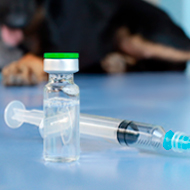NOAH issues warning over ‘anti-vaxx’ movement

Vaccinations in dogs and cats fell by seven per cent from 2011-2017.
The National Office of Animal Health (NOAH) is warning that the ‘anti-vaxx’ movement could give rise to deadly diseases in pets and humans alike, as pet owners become increasingly cautious about vaccinations.
Chief executive Dawn Howard said vaccination has “to some extent become a victim of its own success” as many pet owners no longer see preventable diseases such as parvovirus and canine distemper first hand, meaning they may not see vaccinations as necessary.
According to the latest figures from the PDSA Animal Wellbeing report, vaccinations in dogs and cats fell by seven per cent from 2011-2017. Furthermore, just 50 per cent of rabbits had received a primary vaccination in 2017 and only 55 per cent received annual boosters. NOAH said vaccine coverage is falling ‘dangerously low’ for achieving herd immunity.
Misconceptions surrounding vaccinations are another potential problem - for example, many owners believe indoor cats do not need vaccinations.
Anti-vaxx sentiment is also thought to be on the rise. In human medicine in the US, the anti-vaxx movement has prompted an emergency outbreak of measles in New York state. Measles cases rose sharply in the UK in 2018, mainly spreading from Europe, but particularly in teenagers who were not vaccinated when young.
“Vaccine hesitancy has been named by the World health Organisation (WHO) as one of the top 10 health threats of the year,” Ms Howard said. “It has been suggested by a leading vet that lack of uptake in the veterinary medicine sector could similarly increase the risk of previously eradicated or seldom seen diseases in our pets.”
It is also “important to understand and overcome” barriers to vaccination, she added. NOAH is urging pet owners to speak to their vet about the best way to protect their pet.



 RCVS Knowledge has welcomed Professor Peter Cockcroft as editor-in-chief for Veterinary Evidence.
RCVS Knowledge has welcomed Professor Peter Cockcroft as editor-in-chief for Veterinary Evidence.